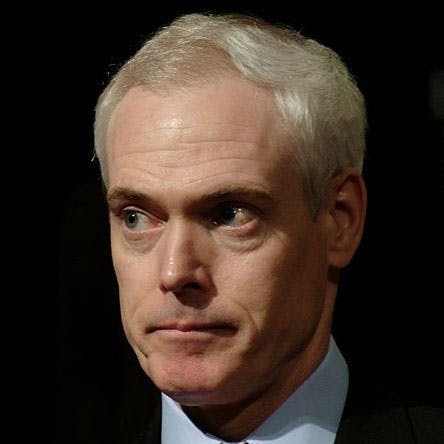Jim Collins
The forever quotable business researcher
Intro
In the late 1980s, James C. “Jim” Collins began his career as a researcher at the Stanford Graduate School of Business.1 Today, he is recognized as an expert in business management, as well as company growth and sustainability. With several publications to his name, Collins’ bestselling novels have fascinated readers outside of his target audience, which is primarily those working in management positions. Known as one of the world’s leading minds in business, Collins has had tremendous influence over the business world and has succeeded in sparking the interest of casual readers as well.
Greatness is not a function of circumstance. Greatness, it turns out, is largely a matter of conscious choice and discipline.
– Jim Collins in Good to Great: Why Some Companies Make the Leap… and Others Don’t
On their shoulders
For millennia, great thinkers and scholars have been working to understand the quirks of the human mind. Today, we’re privileged to put their insights to work, helping organizations to reduce bias and create better outcomes.
Innovative ideas
“What separates people, Stockdale taught me, is not the presence or absence of difficulty, but how they deal with the inevitable difficulties of life.”
-Jim Collins in Good to Great: Why Some Companies Make the Leap… and Others Don’t
Level Five Leadership – What makes a great leader?
Collins strives to help people in management positions make decisions that take their companies from good to great. Of course, it takes a great leader to run a great company. Collins identified five levels of leadership – with level five being the optimal level to which all leaders should aspire. Level five leaders are described as humble yet willful. They are also incredibly ambitious, but that ambition is channeled into advancing their business. Although it is not a requirement, Collins notes that level five leaders are frequently reserved and even shy. This concept was first presented in Collins’ 2001 release, Good to Great: Why Some Companies Make the Leap… and Others Don’t.2
“Good is the enemy of great. And that is one of the key reasons why we have so little that becomes great. We don’t have great schools, principally because we have good schools. We don’t have great government, principally because we have good government. Few people attain great lives, in large part because it is just so easy to settle for a good life.”
-Jim Collins in Good to Great: Why Some Companies Make the Leap… and Others Don’t
With this concept, Collins provided a description of the qualities that make a great, or level five, leader. In his book, he identified eleven companies from the Fortune 500 that had successfully made the transition from what Collins classified as “good” to “great”. He explained that, while all such companies had been in different positions – some offered services, other products, some were in crisis, others more stable – they all had one thing in common: level 5 leadership at the time of transition. One recently appointed chief executive asked Collins if it was impossible for someone to learn to become a level 5 leader. Collins hypothesized that most people had the capacity to develop into level 5 leaders, given the right circumstances under which they could thrive.3
“The good-to-great leaders never wanted to become larger-than-life heroes. They never aspired to be put on a pedestal or become unreachable icons. They were seemingly ordinary people quietly producing extraordinary results. …It is very important to grasp that Level 5 leadership is not just about humility and modesty. It is equally about ferocious resolve, an almost stoic determination to do whatever needs to be done to make the company great.”
– Jim Collins in Good to Great: Why Some Companies Make the Leap… and Others Don’t
First Who, Then What – Great companies are made up of great people
Collins urges companies to get the right people on the bus and make sure the right people are in the proper seats. In other words, make sure your employees are properly suited to your company and that they are good at the jobs they have been given. The “first who, then what” concept was introduced in Good to Great. Collins believes that companies’ transition to greatness is, in no small part, due to the people involved.
“For, in the end, it is impossible to have a great life unless it is a meaningful life. And it is very difficult to have a meaningful life without meaningful work.”
-Jim Collins in Good to Great: Why Some Companies Make the Leap… and Others Don’t
Before deciding what direction to take your business, make sure that your team is made up of the right people. Collins described three points that he believes every great leader should know. First, by beginning with the “who” instead of the “what”, businesses will be more adaptable. This is because if people join the team because of the direction the business is going, this may cause problems down the line if the company has to change its goals. Secondly, the right people will be self-motivated, meaning that management will become a much easier job. A good team will strive for the best possible outcomes without being pushed to do so. Finally, even the best strategy cannot elevate a company to greatness if it is run by the wrong people. The right people are a requirement in order to reach new heights.4
“Yes, compensation and incentives are important, but for very different reasons in good-to-great companies. The purpose of a compensation system should not be to get the right behaviors from the wrong people, but to get the right people on the bus in the first place, and to keep them there.”
– Jim Collins in Good to Great: Why Some Companies Make the Leap… and Others Don’t
Culture of Discipline – Discipline is necessary for the achievement of greatness
According to Collins, disciplined thought and action are the keys to greatness. Collins argues that lack of discipline results in the downfall of a company. It is discipline that will allow a company to weather the increasingly complex storms that come from sustained growth.
“Visionary companies make some of their best moves by experimentation, trial and error, opportunism, and—quite literally—accident. What looks in retrospect like brilliant foresight and preplanning was often the result of “Let’s just try a lot of stuff and keep what works.”
-Jim Collins in Built to Last: Successful Habits of Visionary Companies
Discipline is a starting point in the transition towards greatness. On its own, it is not sufficient to elevate a company to greatness, but it is a necessary feature. Collins claims that the first requirement is to build a team of disciplined people. He specifies that attempting to discipline the wrong people will not pay off; you must find the right people, who are self-disciplined. The next requirement is disciplined thought, which allows you to accept reality, while also persevering towards your goals. Last comes disciplined action, which is only sustainable when your company is made up of disciplined people who engage in disciplined thought.5
“Indeed, discipline by itself will not produce great results. We find plenty of organizations in history that had tremendous discipline and that marched right into disaster, with precision and in nicely formed lines. No, the point is to first get self-disciplined people who engage in very rigorous thinking, who then take disciplined action.”
– Jim Collins in Good to Great: Why Some Companies Make the Leap… and Others Don’t
Historical Biography
American researcher, author, consultant, and speaker, Jim Collins holds a bachelor’s degree in mathematical sciences and an MBA from Stanford University. After obtaining his MBA, Collins took a job at Hewlett-Packard. He lasted eighteen months before quitting and swearing that he would never work for a company again.6 He has stayed true to his word; while he acts as a consultant for companies, he has not worked at one since. Although he does not hold a formal doctorate, Collins has been granted honorary doctoral degrees from the University of Colorado and the Peter F. Drucker Graduate School of Management at Claremont Graduate University. In 1995, he founded a management laboratory in Colorado, where he and his team conduct research on company growth and sustainability.7
“Great vision without great people is irrelevant.”
-Jim Collins in Good to Great: Why Some Companies Make the Leap… and Others Don’t
Collins has dedicated his career to understanding the inner workings of companies, specifically, why some are successful and others are not. He acts as a consultant and speaker, giving companies advice about how they can thrive in a fast-paced, ever-changing business world. His expertise on the matter comes from years of research on the topic. His findings and the concepts he has developed based on them are presented in his six books. His most famous publications are Built to Last: Successful Habits of Visionary Companies, which he wrote in collaboration with Jerry I. Porras and Good to Great: Why Some Companies Make the Leap… and Others Don’t. The former identifies the common characteristics of companies that have achieved sustainable greatness, while the latter answers the question of why some companies are able to elevate themselves from mediocrity to greatness, while others cannot.
“Bad decisions made with good intentions, are still bad decisions.”
-Jim Collins in How the Mighty Fall: And Why Some Companies Never Give In
Collins’ books have provided many leaders with the knowledge necessary to successfully achieve their companies’ goals. The concepts he developed are valuable tools for cultivating growth and sustainability and for understanding the fundamentals of what makes a business great. Furthermore, much of Collins’ work is accessible to people outside of the business sphere, which has led members of the general population to take a more active interest in the subject. This propagation of knowledge is yet another valuable contribution Collins has made to society. In 2017, Collins was included on Forbes’ list of the Top 100 Greatest Living Business Minds.8
Published Works
Built to Last: Successful Habits of Visionary Companies
In this 1994 release, Collins and co-author, Jerry I. Porras, present the results of six years worth of research into what leads a company to enduring greatness. They identified the characteristics shared between these companies and outlined their findings to instruct young businesses striving to reach comparable levels of greatness.
Good to Great: Why Some Companies Make the Leap… and Others Don’t
In Built to Last, Collins identified how great companies stay great. That raised the question of how good, or even mediocre companies manage to make the leap to enduring greatness. The results of Collins’ and his team’s extensive research are presented in his book Good to Great, which was published in 2001.
Great by Choice: Uncertainty, Chaos, and Luck – Why Some Thrive Despite Them All
Alongside Morten T. Hansen, Collins describes why it is that some, but not all, companies thrive in a tumultuous, unpredictable, fast-paced business world. Interestingly, they found that the leaders best suited to this kind of environment are disciplined, empirical and paranoid. While the world may be moving at an alarmingly fast-paced, that does not mean that quick decision-making and spontaneous action are the most adaptive responses.
How The Mighty Fall: And Why Some Companies Never Give In
In this 2009 release, Collins identifies the five stages of a company’s decline: Hubris Born of Success, Undisciplined Pursuit of More, Denial and Risk of Peril, Grasping for Salvation, and Capitulation to Irrelevance or Death. He argues that a thorough understanding of these stages can help leaders develop a plan of action to prevent the fall of their own company. Collins reminds us that no company is invulnerable and most do decline eventually. However, recovery is not impossible.
Collins’ website, JimCollins.com, includes a section dedicated to the various concepts he has developed. The concepts are described with examples from Collins’ books and there are links to related articles and videos for anyone looking to explore Collins’ innovative ideas.
References
- About Jim. JimCollins.com. https://www.jimcollins.com/about.html
- Level 5 Leadership. JimCollins.com. https://www.jimcollins.com/concepts/level-five-leadership.html
- See 2
- First Who…Then What? JimCollins.com. https://www.jimcollins.com/concepts/first-who-then-what.html
- A Culture of Discipline. JimCollins.com. https://www.jimcollins.com/concepts/a-culture-of-discipline.html
- Lenzer, R. 2003. Good to Great. Forbes. https://www.forbes.com/2003/05/05/0505bookfeature.html?sh=44c2ff4d5991
- Jim Collins. Thinkers50. https://thinkers50.com/biographies/jim-collins/
- Brown, A. (2017). 100 Quotes On Business From the 100 Greatest Business Minds. Forbes. https://www.forbes.com/sites/abrambrown/2017/09/19/100-quotes-on-business-from-the-100-greatest-business-minds/#2e6b0e0f5631
About the Authors
Dan Pilat
Dan is a Co-Founder and Managing Director at The Decision Lab. He is a bestselling author of Intention - a book he wrote with Wiley on the mindful application of behavioral science in organizations. Dan has a background in organizational decision making, with a BComm in Decision & Information Systems from McGill University. He has worked on enterprise-level behavioral architecture at TD Securities and BMO Capital Markets, where he advised management on the implementation of systems processing billions of dollars per week. Driven by an appetite for the latest in technology, Dan created a course on business intelligence and lectured at McGill University, and has applied behavioral science to topics such as augmented and virtual reality.
Dr. Sekoul Krastev
Sekoul is a Co-Founder and Managing Director at The Decision Lab. He is a bestselling author of Intention - a book he wrote with Wiley on the mindful application of behavioral science in organizations. A decision scientist with a PhD in Decision Neuroscience from McGill University, Sekoul's work has been featured in peer-reviewed journals and has been presented at conferences around the world. Sekoul previously advised management on innovation and engagement strategy at The Boston Consulting Group as well as on online media strategy at Google. He has a deep interest in the applications of behavioral science to new technology and has published on these topics in places such as the Huffington Post and Strategy & Business.






